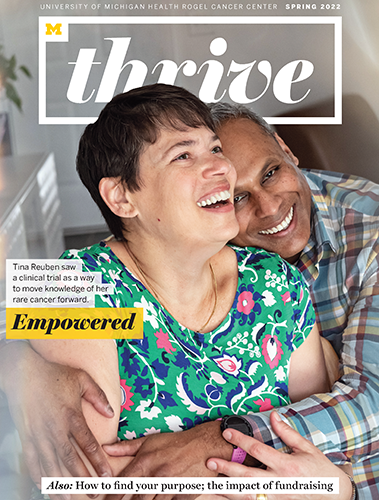Spring, 2022

When U-M public health professor Victor Strecher’s daughter passed away at the age of 19, he navigated his immense grief by committing to teach his students as if they were his own children. He developed new habits and behaviors that helped him show up for his students in the way he wanted, like walking to work, eating healthfully, meditating, getting more sleep and taking better care of himself.
Each summer during Swim Across America’s Motor City Mile event, swimmers paddle through the Detroit River to raise money for Rogel cancer research. By funding work that aims to solve cancer’s most puzzling problems, they’re really investing in their own future. Here, we outline how their dollars (and dolphin kicks) could lead to life-saving results.
When Bradley J. Zebrack, Ph.D., M.S.W., M.P.H., was 25, he thought he might become a schoolteacher. Then he was diagnosed with Hodgkin lymphoma, a cancer that originates in the immune system. In an effort to cope, Zebrack went to a meeting of what would eventually become the well-known support network Cancer Support Community. This experience with social work as well as his experience with lymphoma, led him to a career of helping people dealing with cancer.
As Steve Keating lives with a stage 4 cancer diagnosis, he considers how to share his knowledge with others. One way he's found is by joining the Patient and Family Advisory Council at the cancer center.
Adrenal cancer is diagnosed in one in every million people — and studies to test new treatments for it are just as rare. As the first patient in one of the few clinical trials for the disease, Tina Reuben hopes her participation will advance the field.
